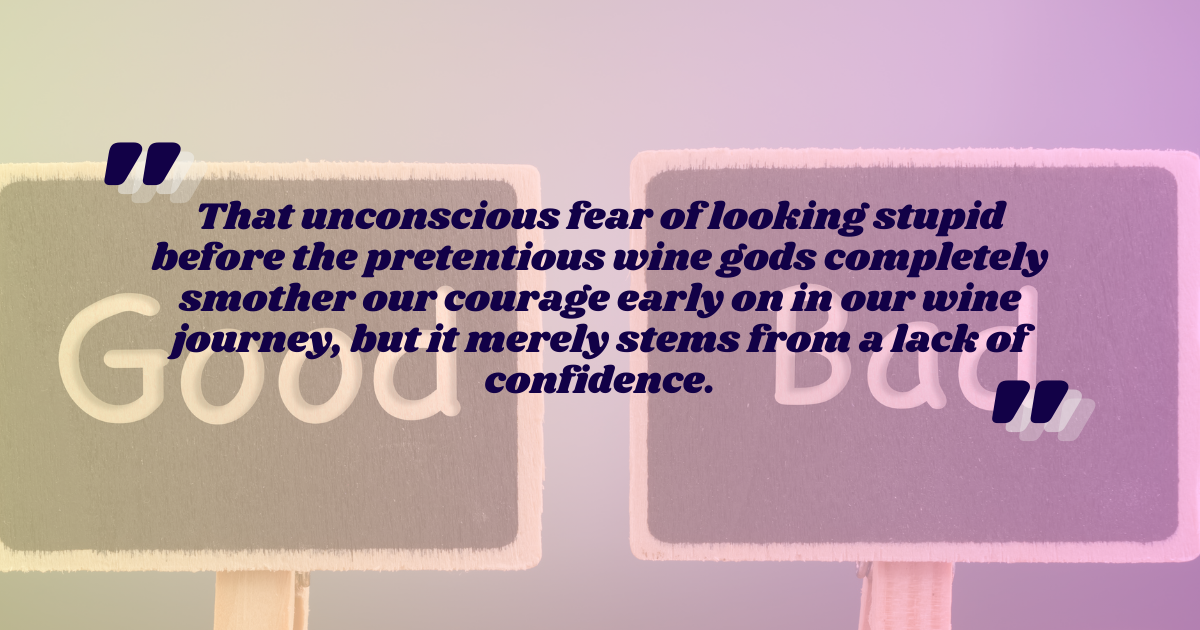How to Dislike a Wine
When you’re first starting your journey into wine you’re going to encounter wines that you absolutely adore and wines that you wish you’d never even sniffed. That’s perfectly normal. I know that, for me, one of the things that made talking about wine sort of frustrating early on was that I knew how to praise a good wine, but I felt a little bit fraudulent having a negative opinion on a wine that I knew wasn’t good because I didn’t know how to properly “hate” on it. Does that make sense? Anyone who knows me knows that I’m a pretty opinionated person, for better or worse, and I’m generally unafraid to have a polarizing take – but with wine it was different. Does the following scenario seem familiar?
Imagine you tell a friend… “Hey, this wine is good!”, your friend might respond: “Yeah, I agree.” But tell someone, “Hey, this wine is kinda trash…”, and that person might say, “What’s wrong with it?” The air in the room changes. A bead of sweat rolls down your forehead as you begin to smack your tongue, biding time, thoughts pounding against your skull.
They probe, “What is it you don’t like?” You notice the tick of the clock on the wall; it’s louder than ever. Seconds stretch to infinity and suddenly the rapture doesn’t sound so bad.
Okay, that’s a little dramatic. But the feeling is relatable, no? It’s sooo easy to say that a wine is good! The industry has trained us to think we don’t know any better, so when we taste a bad wine we’ll find ourselves nodding in an illusioned accord rather than interrupting the shared placation to voice what we know to be true: this wine is kinda trash. That unconscious fear of looking stupid before the pretentious wine gods completely smother our courage early on in our wine journey, but it merely stems from a lack of confidence. Trust me, the more you know exactly what it is you don’t like, the more you’re able to find and appreciate what you do like. Below are a few reasons and explanations as to why you don’t like that new wine. Feel free to absorb the verbiage as your own and brandish it next time you’re confronted about your taste.
“The wine is too oaky” - Some wines are aged in an oak barrel and this produces a pleasant, wood-tasting, earthy essence. Some wines, however, try to emulate this quality by adding wood chips to their winemaking process. It’s a shortcut and it usually tastes like one. If you’re tasting too much oak, it’s possible you're drinking wood-chippy wine and it’s totally fine to call that out. Even if it was aged in a nice barrel, you might just not like that flavor. Own it.
“The wine is too sweet” - This is probably my biggest turn-off in a wine and it happens often enough. Wine can sometimes be sweet because the yeast inside the wine didn’t finish converting all of the sugar to alcohol. It can also be sweet because manufacturers add sugar to the winemaking process. Personally, I find that the sweetness of some wines can be overpowering and detract from the real flavor trying to be expressed. Wine being too sweet is a totally valid reason to dislike it.
“The wine is too dry” - On the other side of the sweetness spectrum, we can easily run into another issue. When a wine is too dry, dry meaning not sweet, it can leave something to be desired on your palate. Sugar is not a bad thing in wine, it’s usually natural and reflects the very grape it came from, but a wine that’s too dry can shock your tongue or make its other qualities seem overpowering.
“The wine is too tannic” - Tannins are compounds from the skins of grapes that stick around in your wine and make your mouth go dry. It can be a cool sensation when it’s not too extreme, but sometimes a wine can be way too tannic; so tannic that it feels like you can’t pull your lips from your gums. That’s a valid reason to dislike a wine if it’s not an experience you enjoy. Voice that.
At the end of the day, you aren’t wrong for how you feel about wine (usually), so take the time you need to equip yourself with a bit of knowledge, and don’t feel afraid to speak up about what you do and don’t like about certain wines. It’s a great exercise that helps you and the people around you better understand their own dispositions and opinions regarding taste, so hate on that wine if you need to!

